2024-04-22
What is one of the most common causes of stress in pet owners? You may agree, that seeing our beloved pets sick makes us worried and very anxious!
This is why it is essential that we are able to identify any fluctuations in the standard behavior of our pets, whether they are dogs, cats, rabbits, birds...etc. Knowing the body language of our loving companions is crucial for enhancing our interaction with them and taking action in a timely manner when needed.
Talking about the health of our pets, it is important to remember, that mental health also plays a vital role in their overall well-being. Just like in humans, stress and anxiety can cause various health issues and are typically accompanied by different symptoms, including vomiting.
Today’s article is dedicated to our gorgeous feline friends, who fascinate us with their unique and sometimes even quirky nature! We will explore the question about stress, and vomiting as a symptom of stress and how both are related.
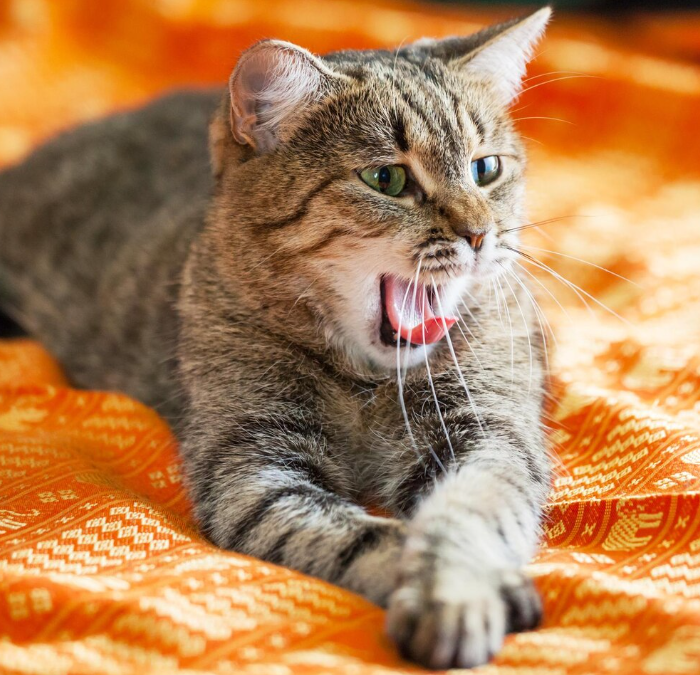
Yes, just like humans, cats do also experience stress. However, unlike humans, they can not express their emotions through words but display them through their body language and changes in their behavior.
According to the National Library of Medicine in regard to stress in cats: “In the SAM axis, the activation of the posterior hypothalamus stimulates the adrenal gland medulla via the splanchnic nerve and causes the release of the fast-acting catecholamines, adrenaline and noradrenaline (NA), which activate the “flight or fight” reaction (36) and mediate the first signs of the stress response such as elevated blood pressure (38) and increased heart rate and respiratory rate (39).”
The “flight or fight” response can be noticed more often in rescue cats / cats that reside in shelters, as they are more likely to have experienced stress-causing events compared with cats purchased from a breeder.
Also, it is worth noting, that despite being domesticated for a long time already, cats have remained connected to their wild ancestors and have persevered their survival instincts. They avoid showing any signs of weakness, in order to protect themselves from predators.
If you have owned both a dog and a cat, you may have noticed how differently they behave when feeling stressed or sick. This depends of course on the individual dog or cat, but generally speaking, cats are less likely to express their pain through vocalization or other visible signs. No, it is rather the opposite. Your feline friend would rather hide somewhere at home and become more distant if they experience some issue than start meowing to show you that they are not feeling well.
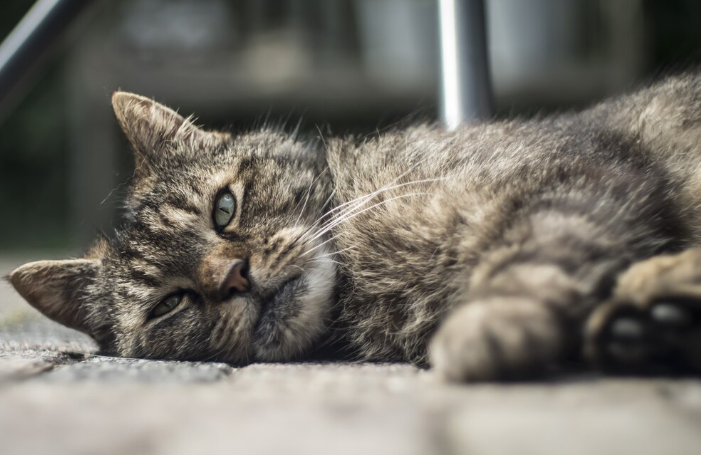
There are actually many factors that can cause the stress levels in our beloved paw friends to increase. The most common ones of them are:
The stimuli in the environment that trigger your feline friend may be different including other animals, people, objects, or even sounds. If you have welcomed a baby or a new pet into your home, the new addition to your family may result in increased stress levels in your current pets. This is why it is highly recommended that you properly socialize them and introduce them to each other step by step. Do not force any interaction, but let the old and the new family members get used to each other's scent and presence and set up designated areas at home for each of them. Allow them to gradually spend more time together and become a part of each other's lives.
Any type of forced interaction with unfamiliar people or animals will lead to increased levels of stress in your furry buddy. Be gentle, considerate, and respectful. Changes in the environment can also be related to moving into a new home or losing a family member. If your feline is strongly attached to a person in the household, who has moved out or passed away, then your feline friend is very likely to experience stress due to these changes.
Both cats and dogs enjoy predictability and although humans may relate it to boredom, for them, it means safety. Having said that, any sudden changes in your feline friend’s routine, such as abruptly switching to another type of food or food brand; relocating the food/water bowl or the litter box to a place that your cat does not like; moving their bedding to another area at home, etc.
If you intend or have to make changes in your cat’s routine, it is highly recommended that you do it step-by-step so your paw friend can adapt to them.
Extremely loud noises like fireworks, thunderstorms, or even loud noises related to household activities like vacuum cleaning, can trigger stress and anxiety in your paw friend.
It is essential that your cat has their area/ spot at home considered a safe zone that makes them feel comfortable and secure. Using catnip or diffusing essential oils for a calming effect can also help your little fellow better deal with the loud noises.
Do not try to comfort your kitty by cuddling with them roughly and disrespecting their personal space. This will only make things worse. Always take your cat’s preferences and need for personal space into account.
Any medical procedures, even simple veterinarian checkups can be perceived by your paw friend as traumatizing and extremely stressful events. In order to help your kitty get accustomed to the vet visits, you might consider applying the following tips:
-Let your cat get used to the presence of the carrier that will be used for transportation to the vet’s office. You might need to place it somewhere near your cat’s food and water bowls or their bedding, so they get accustomed to its presence;
-Pair the carrier with a positive experience. You might consider rewarding your little fellow for being around the carrier, sniffing at it, and especially getting inside on their own. Encouraging your cat to be interested in the carrier will help them associate it with treats, hence something positive;
-Provide your kitty with a plush blanket or other comforting soft items that will make them feel safe;
- Do not let other pets or people in the house that make your cat uncomfortable and cause stress prior to a visit at the vet;
-You may need to opt for a smaller crate. Most cat owners are familiar with the tendency that many cats show, namely to get inside of items that are obviously too small for their size. A smaller carrier might let your little buddy feel more secure. However, you should prove this theory with your own cat and make sure that they will actually feel more comfortable in a smaller confined space;
-Try to remain calm. Not only dogs, but cats as well, can sense our emotions and feelings. If you try to stay calm, your paw friend is also likely to be calmer and balanced.
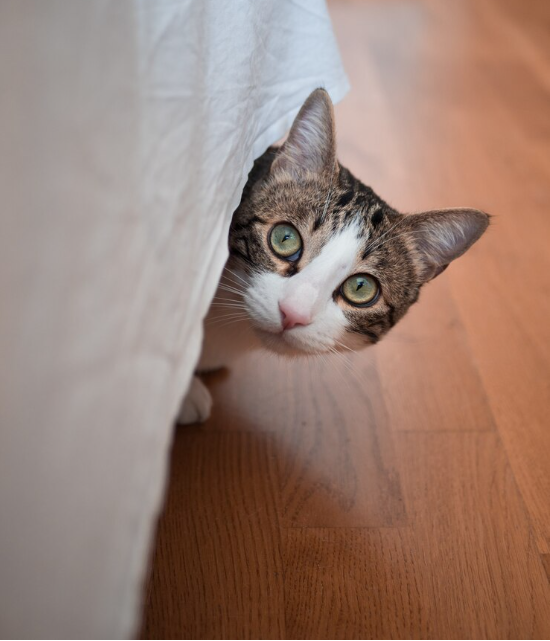
When cats perceive a factor in their environment as a potential threat, their bodies release cortisol, which is known as the hormone of stress. The function of this hormone is to prepare the body for a response to the threat. As we mentioned above, it can be a “fight or flight” response. Increased levels of cortisol can negatively affect digestion as they change the way in which the body processes food. Vomiting, diarrhea, and nausea can occur as a result.
When exposed to stressful events, the muscles in the gastrointestinal tract start contracting more quickly. The higher pace of the contractions can cause disruption in the normal digestive process due to the content in the stomach that is being “pushed” through the system more quickly than it should be. This can cause vomiting.
During stressful situations, blood is redirected from the digestive system towards the brain and muscles. This can also lead to disruption of normal digestion and cause vomiting.
Cats are likely to eat less or even stop eating when under stress. This can lead to an empty stomach, which can lead to an increased buildup of vomiting bile or stomach acid.
Gut microbiota, also known as gut microbiome, or gut flora, are the microorganisms, that live in the digestive tracts of animals. Stress can disrupt the balance of beneficial bacteria in the gut, potentially leading to digestive issues and vomiting.
This is a common disorder affecting the gastrointestinal tract and causing abdominal pain, gas, bloating, constipation, vomiting, diarrhea, or cramping. Some cats are prone to developing IBS, and stress can trigger or worsen this condition.
Stress can cause excessive grooming, leading to the ingestion of more fur. This can result in hairballs, which may trigger vomiting.
If your cat is exposed to stress for a long time, their immune system may weaken, and gastrointestinal problems can also occur as a result.
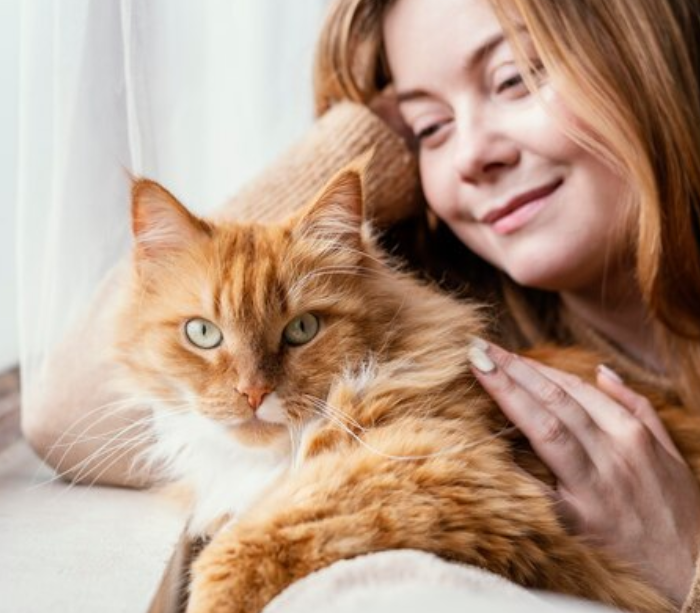
As responsible cat owners, it is our duty to help our feline friends manage stress and remain calm and happy.
As explained above, cats love predictability, which is why it is important that you maintain a consistent routine for them. Avoid making any abrupt changes in their environment and stick to a gradual approach.
Our pets deserve to have their personal space, where they can freely engage in the activities they like, whether this is playing, relaxing, sleeping, or eating. Their safe area is the place where they can find comfort when feeling stressed.
Healthy cats who are mentally and physically stimulated are more likely to manage potentially stressful situations compared to cats who are not properly taken care of.
Although desensitization is a common method in dog training, it can be very effective in cat raising and training as well. Desensitization is a term, related to the gradual exposure of the animal to triggers in the environment. The process should begin with keeping the stimuli at a low level so that no reaction will follow and increasing their intensity step by step.
Simply put, this means gradual introduction to the new stimuli, so that your cat gets used to them. The more accustomed they are, the less reactive and stressed they are likely to be in their presence.
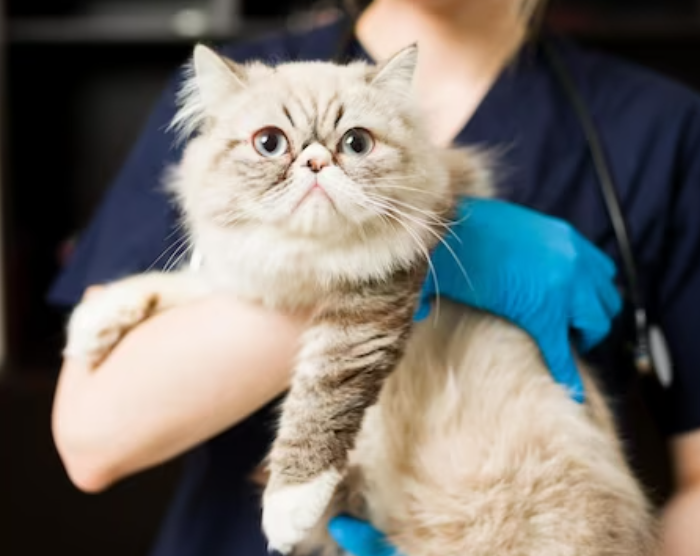
If your feline friend’s vomiting is severe and frequent, make an appointment with a vet immediately. Also, you should not wait more than 24 hours if the symptom does not go away.
Dehydration and lack of appetite can cause serious issues and have a fatal outcome which is why you should never leave your cat stay dehydrated. Two or three days is considered the maximum time a cat can survive without water, so keep that in mind.
Observing your beloved paw friend, and ensuring they are healthy and happy will contribute to their long and happy life.